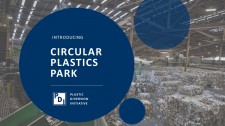A Novel Solution to the Plastic Waste Problem

AUSTIN, Texas, June 16, 2020 (Newswire.com) - The Plastic Diversion Initiative (PDI) launched by a collective of organizations with a mission to divert recyclable plastic from landfills and the natural environment has released a White Paper with an innovative solution to address the global plastic waste problem.
Only 9% of the plastic that’s ever been produced has been recycled - meaning 91% has been buried in landfills, burned, or dumped into oceans. According to The Ellen MacArthur Foundation, it’s estimated that by 2050 there will be more plastic in the ocean than fish.
At the same time, hundreds of the world’s largest corporations that produce more than half of all plastic packaging claim that only 6% of their demand for recycled plastic is currently met.
“We believe the Circular Plastics Economy is extremely inefficient and that is the root of the problem. Unfortunately, it’s a lot cheaper to dispose of plastic waste than recycle it and that’s the main reason why it ends up in landfills. With plastic production expected to triple by 2050, growing inefficiency of the circular plastics economy may lead to complete failure and collapse of the system with colossal economic and environmental consequences,” says PDI founder and the CEO of Scrapo Inc, Rashad Abbasov.
The White Paper released by PDI introduces a “Circular Plastics Park” of the future - a zero-waste, highly efficient circular plastics ecosystem where plastic resources are conserved, recovered, and redirected back to domestic manufacturing supply-chains.
According to the White Paper, the Circular Plastics Parks will have the following structure:
Plastic Conservation Center – a facility where plastic without existing markets or a lack of quantity can be recovered, conglomerated for processing, or conserved for future use.
Recycling infrastructure – a network of mechanical and chemical recycling facilities built around the Conservation Center to fully recycle and/or convert recovered plastic resources.
Recycled Plastic Marketplace - a technology platform to connect plastic recycling infrastructure with plastic manufacturers/end-users and develop new markets for recycled plastic.
Circular Plastics Parks will conserve and recover plastic resources that would otherwise end up in landfills and the ocean. Efficiency will be achieved by eliminating transportation and transaction costs, as well as the cost of sourcing and intermediation, while significantly increasing the output. Proximity to large and consolidated feedstock will help achieve “economies of scale” and further increase the efficiency. Furthermore, collaboration and interactions between businesses in the circular Park will create multiple operational synergies.
“We believe the concentration of technologically advanced recycling facilities, huge and cheap feedstock, and the recycled plastic marketplace in close proximity will dramatically reduce the transaction costs and increase efficiency. More importantly, Circular Plastics Parks will employ thousands of people across America and help bring back jobs that have been lost due to global pandemic and inefficiency of the circular plastics economy,” says Abbasov.
The Circular Plastics Parks, according to the PDI Paper, will drive innovation and serve as a magnet for green tech startups, entrepreneurs, and venture capital, which in effect may lay the foundation for a much larger ecosystem for green technology.
“Plastic waste is a common problem, and we can solve it when we work together, which is why we need the support of every individual and corporation, federal and local government, non-profit organizations and private foundations. We are calling on those who share our mission to partner with us in building the Circular Plastics Parks in the United States and other parts of the world to stop plastic waste and effectively divert plastic from the natural environment.” - concluded Rashad Abbasov.
Source: Plastic Diversion Initiative